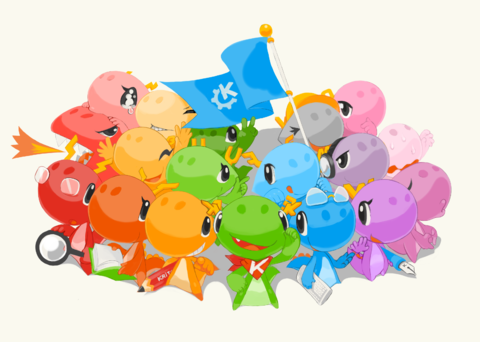Main Page

Welcome to the KDE Community Wiki! This is the working area for community members and contributors. It contains information to collaborate on projects and goals.
This wiki contains guides for getting involved with the community, setting up a development environment for building KDE software, reporting bugs, translating software, and getting in touch with different KDE projects and teams.
If you are interested in how to use KDE Frameworks and libraries for your software, please take a peek at the TechBase wiki for guides and tutorials.
Hot right now
- Current Goals
- GSoC, GCi, SoK and OPfW
- User manual for git.kde.org
- Events KDE will be attending
- KDE Frameworks
Community Information Hub
Get started with learning and contributing to KDE. Review the links below and let us know how we can help!
New to KDE? Start here!
Policies covering development of KDE software. Related: Guidelines and how-tos
Upcoming freezes and release dates for KDE's main products.
Infrastructure provided for KDE projects, such as source control and systems for translators.
Guidelines for creating good software, and helpful information for contributors that is not project-specific.
Keynotes and presentations by the KDE community.
Community Management and Coordination
These teams help keep the KDE community running smoothly by providing support, administration and arbitration:
- Community Working Group: keeping the community running smoothly
- KDE e.V.: financial and legal administration
- Incubator: process for adding existing projects to the KDE family
- Leadership
- Mentoring: programmes for introducing new contributors to KDE
- The KDE Network
- Promo: getting the word out about KDE
- Sysadmin: building and maintaining KDE infrastructure
Things to deal with:
- KDE.org Websites
- KDE Forums - Information about forum.kde.org for developers and contributors
- KDE Student Programs - Functional guide of season.kde.org for students, mentors and admins
- KDE — various documentation affecting the entire community
Cross-Project Teams
These teams work on areas common across lots of projects, sharing their expertise and working on tasks that individual projects often don't have the resources to manage on their own.
- Accessibility
- Bug Triaging
- Documentation
- Gardening
- Localization
- Research
- User Support
- Platform teams
- Visual Design Group
Projects
These are pages for specific projects. These can be pieces or collections of software, specific websites or other relatively self-contained areas of work.
- Alkimia
- Baloo — Metadata and search
- Bodega — Content publishing and delivery system
- Commit Digest
- Common Task Videos
- Calligra - Office and creative suite
- digiKam
- Dolphin
- Gwenview
- ISOImageWriter
- KDE Utils
- KGet
- KIO GDrive
- Kopete
- Multimedia
- LatteDock
- Rekonq
- Solid — KDE hardware teams
- Sonnet – Spell checking extraordinaire
- Okular -- KDE PDF reader
- Playground -- Projects that are not ready but still in discussion
- KDE Core — Core modules of KDE, including kdelibs
- KDE Edu
- KDE Frameworks 5
- KDE Games
- KDE PIM
- KDE Science
- KDevelop
- KSecretService
- Krita — Painting for Digital Artists
- KWin
- Necessitas
- Neon
- Ocs-server
- Plasma Project Team Coordination
- Real-Time Communication and Collaboration (Telepathy)
- RKWard GUI for R
- Zanshin
- Akademy Tools - Digital Tooling for Planning and Organising the KDE Annual World Summit
Subcommunities
These are groups that come together based on shared experiences, rather than because they are working on the same thing.

